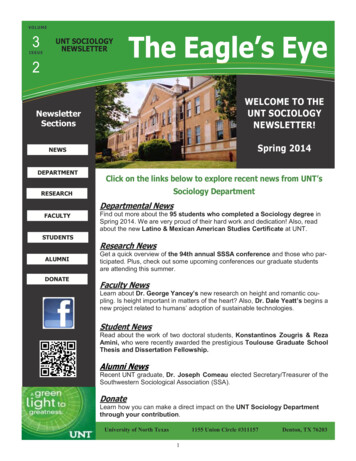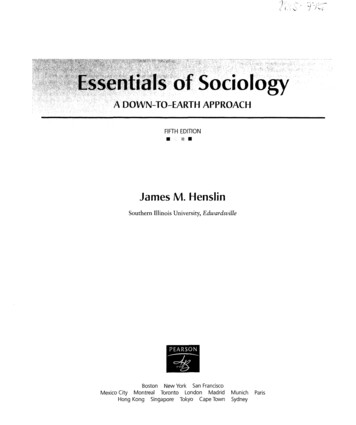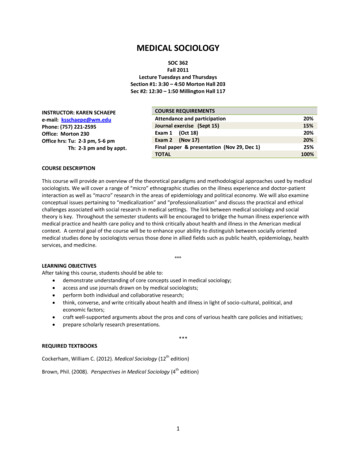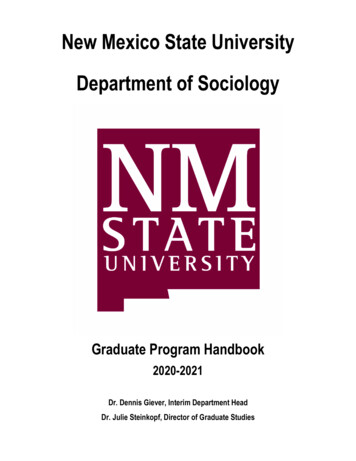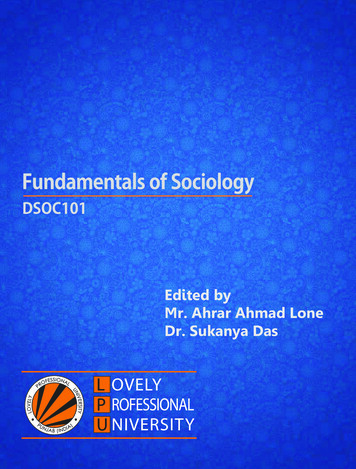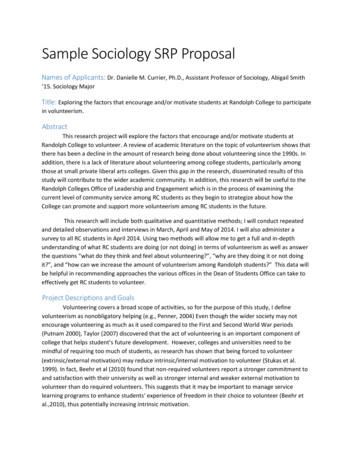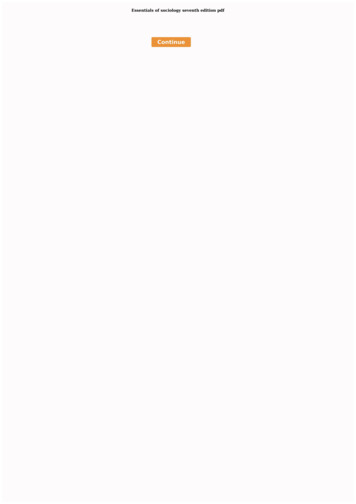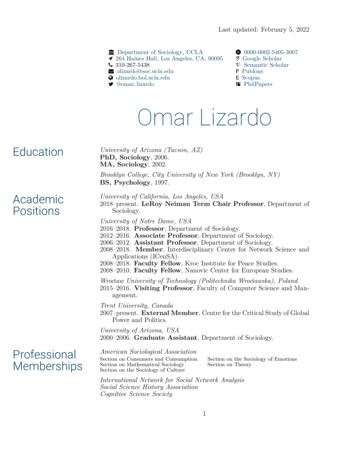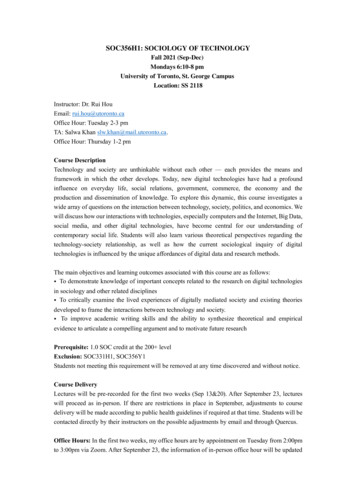
Transcription
SOC356H1: SOCIOLOGY OF TECHNOLOGYFall 2021 (Sep-Dec)Mondays 6:10-8 pmUniversity of Toronto, St. George CampusLocation: SS 2118Instructor: Dr. Rui HouEmail: rui.hou@utoronto.caOffice Hour: Tuesday 2-3 pmTA: Salwa Khan slw.khan@mail.utoronto.ca.Office Hour: Thursday 1-2 pmCourse DescriptionTechnology and society are unthinkable without each other — each provides the means andframework in which the other develops. Today, new digital technologies have had a profoundinfluence on everyday life, social relations, government, commerce, the economy and theproduction and dissemination of knowledge. To explore this dynamic, this course investigates awide array of questions on the interaction between technology, society, politics, and economics. Wewill discuss how our interactions with technologies, especially computers and the Internet, Big Data,social media, and other digital technologies, have become central for our understanding ofcontemporary social life. Students will also learn various theoretical perspectives regarding thetechnology-society relationship, as well as how the current sociological inquiry of digitaltechnologies is influenced by the unique affordances of digital data and research methods.The main objectives and learning outcomes associated with this course are as follows: To demonstrate knowledge of important concepts related to the research on digital technologiesin sociology and other related disciplines To critically examine the lived experiences of digitally mediated society and existing theoriesdeveloped to frame the interactions between technology and society. To improve academic writing skills and the ability to synthesize theoretical and empiricalevidence to articulate a compelling argument and to motivate future researchPrerequisite: 1.0 SOC credit at the 200 levelExclusion: SOC331H1, SOC356Y1Students not meeting this requirement will be removed at any time discovered and without notice.Course DeliveryLectures will be pre-recorded for the first two weeks (Sep 13&20). After September 23, lectureswill proceed as in-person. If there are restrictions in place in September, adjustments to coursedelivery will be made according to public health guidelines if required at that time. Students will becontacted directly by their instructors on the possible adjustments by email and through Quercus.Office Hours: In the first two weeks, my office hours are by appointment on Tuesday from 2:00pmto 3:00pm via Zoom. After September 23, the information of in-person office hour will be updated
via Quercus.EmailWhen emailing the instructor or TA, please use your mail.utoronto.ca address. My goal is to answeremails from students within 48 hours, with the exception of those received on Fridays (these will beanswered on Mondays or the next business day if the Monday is a holiday). If I have not respondedto you within 48 hours, please do not hesitate to follow up. Please include “SOC356” in the subjectline of the email.Course WebsiteThe course website on Quercus contains the syllabus, announcements, posted lectures, readings,tutorial materials, discussion boards, assignment instructions, and grades. Students can also accessBb Collaborate through the course’s home page, which is the platform used for participating insynchronous sessions and attending office hours. Please note that students are responsible forregularly checking both Quercus and their official utoronto.ca email addresses for course updates.Course ReadingThe required reading listed for each week will be provided on Quercus for students to read onlineor print. Readings marked as supplementary are not required and are not testable, although they area great resource for those interested in reading more deeply about a particular topic and can be usedas sources for the ng responseMovie reviewCritical questionTerm paperWeight15%15%20%15%35%Due dateOngoingNov. 15Oct 4Oct 25Dec. 13Movie Review (20)Topic: Students are asked to write a review of a movie/documentary (1000 words) dealing withdigital technology. A list of movies attached with the syllabus is available, and these movies are preapproved for review. Other movies can be chosen with the permission of the instructor/TA. Youaren't expected to reference particular texts at this stage, rather it's about ideas: how to usesociological conceptual tools to examine the chosen movie content. But, if you do mention aparticular work (book, article, website etc.), then please do cite it properly according to Sociologydepartment guidelines. This is not simply about your personal opinion of the film! The majority ofyour paper should be academic (i.e., don’t spend too much space reviewing the performance ofactors/actresses).One Reading Response (15)Reading responses are designed to guide and sharpen your engagement with course texts. A reading
response asks the reader [you] to review the chosen reading and explain and defend your personalreaction to it. You will choose one peer-review article1 from the course reading list and review it inthe format of short essay (750 words). Two components should include in the writing: 1. A carefulsummary of the work’s central features such as its main puzzle, research question, main thesis, andmethodology. 2. A examine, explain and defense of your reaction to the work: you can eitherevaluate strengths and weaknesses of the chosen articles, or engage a critical conversation betweenthe chosen article’s argument/concept and your own life experience.Final Project (15 35)Final projects will explore the nexus of digital technology and human life by completing a termpaper. This assignment is split into two main parts:(1) Critical Question: The first is a critical question due on Oct 25 in which students outline theirintended topic and a tentative research question which will be explored in the final term paper.You should choose a topic and use it to create a critical question for your term paper. The'question' can be an actual question, a question with sub-questions, a statement to be discussed,a hypothesis to be tested, or any other way you can think of to problematize the subject. (Thequestion can have a subtitle, and up to three sub-questions but no more). The question must be:1. Critical, that is it must challenge and go beyond the 'common-sense' and the mundane;2. Of sociological or more broadly social scientific interest;3. Possible to answer given the constraints of time and resources available to you;4. Justified with a brief 300-word outline.5. Supported by 10 indicative references (key examples of the kinds of sources you will use).(2) Term Paper: The second is a longer, finalized term paper (3000 words) that is due on Dec 15 andinvolves a detail clarification and exploration of your critical essay question (35%). It is expectedthat you show familiarity with social theories and empirical research, and approach the subject in acritical manner. More in-depth instructions will be posted on Quercus.Participation (15)Participation will be assessed on the basis of in-class engagement and assessments. The instructorwill randomly choose 3-5 class days in which you will complete a quiz, short writing assignment,or other activity. These activities are designed to demonstrate that you have done the reading andpaid attention in lecture. If you miss more than three class sessions, it is likely to compromise yourparticipation grade.*All assignments should be typed in 12-point Times New Roman, double-spaced, with one-inchmargins. They should include a cover page with a title, your name, student ID number, the coursename, and the date. Assignments should be clearly formatted and proofread, with references citedcorrectly according to ASA guidelines.Students who miss the test or are late in submitting an assignment for medical reasons, need to email1You can choose the reading from either the required reading list or the supplementary reading list, butyou may notice that there are more peer-review articles in Supplementary Readings.
the instructor (not the TA), and declare their absence on the system (ACORN).(NOTE: Because of Covid-19, students do NOT need to submit the usual documentation, i.e.,medical notes or the Verification of Illness forms). Students who miss the test or are late insubmitting an assignment for other reasons, such as family or other personal reasons, should requesttheir College Registrar to email the instructor.Movie ListHer(2013) https://www.imdb.com/title/tt1798709/?ref fn al tt 1Facebook Dilemma (2018) Part 1 or Part 2Part1https://www.imdb.com/title/tt9207216/?ref fn al tt 1Part2https://www.imdb.com/title/tt9209914/?ref fn al tt 2The Circle (2017) https://www.imdb.com/title/tt4287320/Snowden (2016) https://www.imdb.com/title/tt3774114/?ref fn al tt 1Citizenfour (2014) https://www.imdb.com/title/tt4044364/?ref fn al tt 1iHuman (2019) https://www.imdb.com/title/tt11279794/?ref fn al tt 1The Social Dilemma (2020) https://www.imdb.com/title/tt11464826/?ref fn al tt 1In the Age of AI (2019) https://www.imdb.com/title/tt11240426/?ref fn al tt 1The Social Network (2010) https://www.imdb.com/title/tt1285016/?ref fn al tt 1Nosedive (Black Mirror, 2016) https://www.imdb.com/title/tt5497778/Screening Surveillance (2019) illanceMost movies in this list are offered by UofT Libraries, available for individual streaming whenlogged in with your UTORID. Individual title records are available in the UofT Libraries Catalogue.Criterion-on-Demand and The Film Platform Collection are the two suggested channels that youcan use your UTORid to access more tech-related movie resourcesMore details in: lmGrade AppealsInstructors and teaching assistants take the marking of assignments very seriously and will workdiligently to be fair, consistent, and accurate. Nonetheless, mistakes and oversights occasionallyhappen. In the case of a mathematical error, simply alert the TA or instructor of the error.For more substantive appeals you must adhere to the following policies. To appeal a grade and haveyour work re-assessed, you must provide written justification to your TA explaining the basis forthis reconsideration and, where relevant, attach your original assignment with comments. Youshould specifically address how you believe your assignment better met the criteria from theassignment guidelines while also taking into account the individual comments or communityfeedback. To start this re-assessment process, students must wait 24 hours following the return ofthe grades and comments—any grade appeals sent within this timeframe will not be considered.Note, that as per FAS policy, once your work has been re-assessed, the grade can go up, down, orremain the same based on this second evaluation. Subsequent appeals will go to the course instructor.Furthermore, no requests for grade appeals will be granted after two weeks following the return ofthe assignment’s grade and feedback.
Academic IntegrityAcademic integrity is fundamental to learning and scholarship at the University of Toronto.Participating honestly, respectfully, responsibly, and fairly in this academic community ensures thatthe University of Toronto degree that you earn will be valued as a true indication of your individualacademic achievement and will continue to receive the respect and recognition it deserves.Familiarize yourself with the University of Toronto’s Code of Behaviour on Academic Matters andother integrity policies. To avoid issues related to plagiarism, please see the advice ondocumentation format and methods of properly integrating sources.“Normally, students will be required to submit their course essays to the University’s plagiarismdetection tool for a review of textual similarity and detection of possible plagiarism. In doing so,students will allow their essays to be included as source documents in the tool’s reference database,where they will be used solely for the purpose of detecting plagiarism. The terms that apply to theUniversity’s use of this tool are described on the Centre for Teaching Support & Innovation website (https://uoft.me/pdt-faq)”Students agree that by taking this course, submitted works may be subjected to processing throughOuriginal for a review of textual similarity and detection of possible plagiarism. In doing so,students will allow their essays to be included as source documents in the Ouriginal referencedatabase, where they will be used solely for the purpose of detecting plagiarism. The terms thatapply to the University's use of the Ouriginal service are described on the Centre for TeachingSupport & Innovation web site. Assignments not submitted through Ouriginal will receive a gradeof zero (0%) unless a student instead provides, along with their paper, sufficient secondary material(e.g. reading notes, outlines of paper, rough drafts of the final draft, etc.) to establish that the paperthey submit is truly their own. The alternative (not submitting via Ouriginal) is in place because,strictly speaking, using Ouriginal is voluntary for students at the University of Toronto.AccessibilityThe University of Toronto is committed to accessibility. If you require accommodations or have anyaccessibility concerns, contact your instructor as soon as possible to discuss how best to assist youin the course. Furthermore, if you are registered with Accessibility Services, you must supply theappropriate documentation or your counselor will need send an email message on your behalfCourse ScheduleEvery attempt will be made to follow this schedule; however, it is subject to change at the discretionof the instructor. Any adjustments to topics or readings will be announced on Quercus.Week 1 (September 13): Introduction: Technological society and digitlised sociologyRequired Readings:Selwyn, Neil, 2019, What is Digital Sociology, Chapter 1
Quan-Haase, Anabel, 2020, Technology&Society (3rd Edition), Oxford University Press, pp1-22Supplementary Readings:DiMaggio, Paul, Eszter Hargittai, W. Russell Neuman, and John P. Robinson. 2001. “SocialImplications of the Internet.” Annual Review of Sociology 27(1):307-336.Fussey, Pete, and Silke Roth, 2020, “Digitizing Sociology: Continuity and Change in the InternetEra.” Sociology 54, no. 4: 659–74.Lupton, Deborah. 2014. Digital Sociology. Routledge, pp1-19Week 2(September 20): Theories and conceptsRequired Readings:Selwyn, Neil, 2019, What is Digital Sociology, Chapter 2Lupton, Deborah. Digital sociology. Routledge, 2014. pp.20-41Supplementary Readings:Klein, Hans K., and Daniel Lee Kleinman. 2002. "The social construction of technology:Structural considerations." Science, Technology, & Human Values 27(1): 28-52.Chayko, Mary. 2015. “The First Web Theorist? Georg Simmel and the Legacy of ‘The Web ofGroup-Affiliations’." Information, Communication, & Society 18(12): 1419-1422.Julien, Chris. 2015. "Bourdieu, social capital and online interaction." Sociology 49(2): 356-373.Gunderson, Ryan. 2016. "The sociology of technology before the turn to technology."Technology in Society 47: 40-48.Dafoe, Allan. 2015. “On Technological Determinism: A Typology, Scope Conditions, and aMechanism.” Science, Technology, & Human Values 40(6): 1047–76.Week 3(September 27): Digital research methodsRequired Readings:Neil Selwyn, 2019, What is Digital Sociology, Chapter 4Lupton, Deborah. 2014. Digital Sociology. Routledge, pp.42-65Supplementary Readings:Ruppert, Evelyn, John Law, and Mike Savage. 2013. “Reassembling Social Science Methods:The Challenge of Digital Devices.” Theory, Culture & Society 30(4): 22–46.Edelmann, Achim, Tom Wolff, Danielle Montagne, and Christopher A. Bail. 2020."Computational social science and sociology." Annual Review of Sociology 46: 61-81.Murthy, Dhiraj. 2008. "Digital ethnography: An examination of the use of new technologies forsocial research." Sociology 42(5): 837-855.Kaufmann, Mareile, and Meropi Tzanetakis. 2020. “Doing Internet Research with Hard-toReach Communities: Methodological Reflections on Gaining Meaningful Access.” QualitativeResearch 20 (6): 927–44.Murphy, Alexandra K., Colin Jerolmack, and DeAnna Smith. 2021 "Ethnography, DataTransparency, and the Information Age." Annual Review of Sociology 47:41-61.Week 4(October 4): Tech-driven interaction: social relationship and communityRequired Readings:Quan-Haase, Anabel, 2020, Technology &Society (3rd Edition), Oxford University Press, pp184234
Supplementary Readings:Rettie, Ruth. 2009. "Mobile phone communication: Extending Goffman to mediatedinteraction." Sociology 43(3): 421-438.Rettie, Ruth. 2009. "SMS: Exploiting the interactional characteristics of near-synchrony."Information, Communication & Society 12(8): 1131-1148.Murthy, Dhiraj. 2012. "Towards a sociological understanding of social media: TheorizingTwitter." Sociology 46(6): 1059-1073.Diamant-Cohen, A. and Golan, O. 2017. Downloading culture: community building in adecentralized file-sharing collective. Information, Communication & Society, 20(11), pp.17371755.Week 5 (October 11, Thanksgiving, No class)Week 6 (October 18): Tech-drive life: Identity, body, and emotionsRequired Readings:Lupton, Deborah. 2014. Digital Sociology. Routledge, Pp.164-187McStay, Andrew. 2018. Emotional AI: The rise of empathic media. Sage. pp1-28Supplementary Readings:Goriunova, Olga. 2019. "The digital subject: People as data as persons." Theory, Culture &Society 36(6): 125-145.Goode, J., 2010. The digital identity divide: how technology knowledge impacts college students.New media & society, 12(3), pp.497-513.Sanders, Rachel.2017."Self-tracking in the digital era: Biopower, patriarchy, and the newbiometric body projects." Body & Society 23(1): 36-63.Kennedy, Helen, and Rosemary Lucy Hill. 2018. "The feeling of numbers: Emotions in everydayengagements with data and their visualisation." Sociology 52(4): 830-848.Laura Grindstaff & Gabriella Torres Valencia. 2021. The filtered self: selfies and gendered mediaproduction, Information, Communication & Society, 24(5): 733-750Week 7(October 25): Tech-driven inequality and digital divideRequired Readings:Quan-Haase, Anabel, 2020, Technology &Society (3rd Edition), Oxford University Press, pp119139Lupton, Deborah. 2014. Digital Sociology. Routledge, Pp.117-140Halford, Susan, and Mike Savage. 2010. "Reconceptualizing digital social inequality."Information, Communication & Society 13(7): 937-955.Supplementary Readings:Deursen, Alexander JAM van, and Jan AGM van Dijk. 2019. “The First-Level Digital DivideShifts from Inequalities in Physical Access to Inequalities in Material Access.” New Media &Society 21(2): 354–75.White, Patrick, and Neil Selwyn. 2013. "Moving on-line? An analysis of patterns of adultInternet use in the UK, 2002–2010." Information, Communication & Society 16(1): 1-27.Van Dijk, J.A., 2006. Digital divide research, achievements, and shortcomings. Poetics, 34(4-5),pp.221-235.
Hargittai E. 2010. ‘Digital na(t)ives? Variation in Internet skills and uses among members of the“Net generation.” Sociological Inquiry 80(1): 92–113.Hargittai E and Dobransky K (2017) Old dogs, new clicks: digital inequality in skills and usesamong older adults. Canadian Journal of Communication 42(2): 195–212.Cruz, Taylor M. 2020. “Perils of Data-Driven Equity: Safety-Net Care and Big Data’s ElusiveGrasp on Health Inequality.” Big Data & Society, (January, online first).Kvasny, Lynette. 2006. "Cultural (re) production of digital inequality in a US communitytechnology initiative." Information, Communication & Society 9(02): 160-181.Brayne, S. 2017. “Big Data Surveillance: The Case of Policing.” American Sociological Review82(5):977–1008.Week 8(November 1): Digital laborRequired Readings:Quan-Haase, Anabel, 2020, Technology &Society (3rd Edition), Oxford University Press, pp140160.Selwyn, Neil, 2019, What is Digital Sociology, Chapter 1. Pp33-65Supplementary Readings:Bucher, Eliane, and Christian Fieseler. 2017. "The flow of digital labor." New media & society19(11): 1868-1886.Siciliano, Michael L. 2016."Control from on high: Cloud-computing, skill, and acute frustrationamong analytics workers in the digital publishing industry." In Research in the Sociology of Work.Emerald Group Publishing LimitedPostigo, Hector. 2016. “The Socio-Technical Architecture of Digital Labor: Converting Play intoYouTube Money.” New Media & Society 18(2): 332–49.Week 9 (November 8, Reading Week)Week 10(November 15): Platform economy and surveillance capitalismRequired Readings:Kenney, Martin, and John Zysman. “The Rise of the Platform Economy.” Issues in Science andTechnology 32, no. 3 (Spring 2016).Zuboff, Shoshana, Norma Möllers, David Murakami Wood, and David Lyon. 2019."Surveillance Capitalism: An Interview with Shoshana Zuboff." Surveillance & Society 17(1/2):257-266.Supplementary Readings:Zuboff, Shoshana. 2015. "Big other: surveillance capitalism and the prospects of an informationcivilization." Journal of information technology 30(1): 75-89.Vallas, Steven, and Juliet B. Schor. 2020. "What do platforms do? Understanding the gigeconomy." Annual Review of Sociology 46: 273-294.Schor, Juliet B., and Steven P. Vallas. 2021. "The Sharing Economy: Rhetoric and Reality."Annual Review of Sociology 47: 369-389Week 11(November 22) Digital participation and tech-driven repressionRequired Readings:
Lupton, Deborah. 2014. Digital Sociology. Routledge. pp.141-163Deibert, Ron. 2015. "Authoritarianism goes global: cyberspace under siege." Journal ofDemocracy 26(3): 64-78.Supplementary Readings:Lei, Ya-Wen. 2021. “Delivering Solidarity: Platform Architecture and Collective Contention inChina’s Platform Economy.” American Sociological Review 86(2): 279–309.MacKinnon, R., 2011. Liberation Technology: China's" Networked Authoritarianism". Journalof Democracy, 22(2), pp.32-46.Julia Velkova & Anne Kaun (2021) Algorithmic resistance: media practices and the politics ofrepair, Information, Communication & Society, 24(4): 523-540Week 12(November 29): Digital cultureRequired Readings:Deuze, Mark. 2006. "Participation, remediation, bricolage: Considering principal componentsof a digital culture." The information society 22(2): 63-75.Lyon, David. "Digital citizenship and surveillance Surveillance culture: engagement, exposure,and ethics in digital modernity." International Journal of Communication 11(19):824-842Supplementary Readings:Kecheng Fang (2020) Turning a communist party leader into an internet meme: the political andapolitical aspects of China’s toad worship culture, Information, Communication & Society, 23:1,38-58Brian Elliott (2018) Work, culture, and play in the neoliberal condition, Information,Communication & Society, 21(9): 1279-1292McLean, Paul. 2016. Culture in networks. John Wiley & Sons, 2016: Chapter 1Week 13(December 6): New directions and future challengesRequired Readings:Lupton, Deborah. 2014. Digital Sociology. Routledge. Chapter 5Jenna Burrell and Marion Fourcade. 2021. The Society of Algorithms. Annual Review ofSociology 47:213-237Supplementary Readings:Joyce, Kelly, Laurel Smith-Doerr, Sharla Alegria, Susan Bell, Taylor Cruz, Steve G. Hoffman,Safiya Umoja Noble, and Benjamin Shestakofsky. 2021. “Toward a Sociology of ArtificialIntelligence: A Call for Research on Inequalities and Structural Change.” Socius, online firstRuppert, Evelyn, Engin Isin, and Didier Bigo. 2017. "Data politics." Big data & society 4(2): 17Week 14(Pre-recorded lecture will be available as the make-up for Thanksgiving Monday):Digital societies during the PandemicRequired Readings:Vallee, Mickey.2020. “Doing Nothing Does Something: Embodiment and Data in the COVID19 Pandemic.” Big Data & Society, Online first.Wamsley D, Chin-Yee B. 2020. COVID-19, Digital health technology and the politics of the
unprecedented. Big Data & Society. Online firstLiu, Chuncheng, and Ross Graham. 2020. “Making Sense of Algorithms: Relational Perceptionof Contact Tracing and Risk Assessment during COVID-19.” Big Data & Society. Online first.
Topic: Students are asked to write a review of a movie/documentary (1000 words) dealing with digital technology. A list of movies attached with the syllabus is available, and these movies are pre-approved for review. Other movies can be chosen with the permission of the instructor/TA. You
